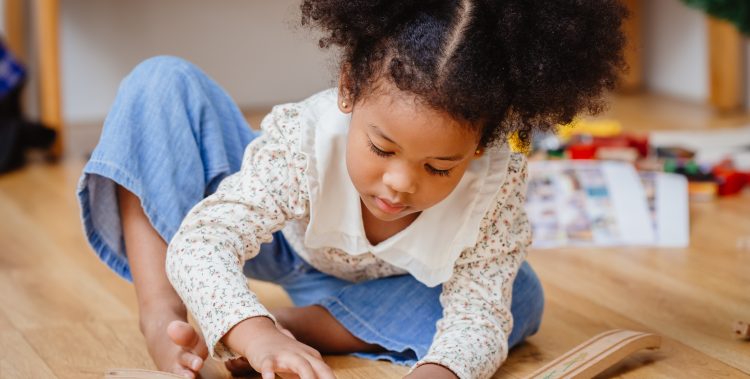
9 simple ways to encourage independent play
On May 28, 2023 by Calgary's ChildBy Stacie Gaetz
As much as we love spending time with our kids, we all need them to play independently sometimes so we can get things done.
There is nothing better than spending quality time with your child playing, learning and growing together but it is not realistic for you to do that all day, every day.
Children need to learn to keep themselves busy from time to time. It is a skill they will require as they grow from a toddler to a kid, then into a teen and well into their adult years.
Some things that are important to keep in mind when setting ourselves up for success with independent activities are:
- Some children are naturally better at playing by themselves than others.
- Parent’s expectations should correspond with the child’s age.
- How well they take part in activities by themselves will depend on their mood and current needs (are they tired, hungry, getting sick?).
- Children learn from interacting with others, so they intrinsically crave socialization. Going against that, and taking part in activities alone, can seem unnatural to a kid.
However, there are things that parents can do to help children build independence and entertain themselves (at least for short periods of time).
Here are nine tips to encourage your child to play independently:
Have realistic expectations
This is the most important tip by far. You can’t expect your three-year-old to sit quietly for an hour while you are on a work call, but it may be reasonable for them to work independently on solving a simple puzzle for eight to ten minutes. That said, all children have different needs and levels of tolerance. Your laid-back kiddo may be able to coast along by themselves for much longer than your demanding one. Know what is realistic to expect from your child and start with that, then help them extend the time they are doing sole play by small bits at a time.
Make a “yes” space
This is a BIG one for our family. Create a room or floor in your house where children can play with/touch anything in that room. This may mean moving things (even furniture) out of the space and child proofing with electric outlet covers (even for curious children who are a bit older) but it can pay off in the end. It can also be helpful to rotate toys in and out of this room. Have some toys downstairs and then bring them up the next time you want to use the room for independent play for a whole new experience. It is important that your child can access all the things they may want to play with in this area. If books are too high on the shelf or the box they want to get a toy from is too heavy, they will come interrupt you and ask for help.
Stay close
Many children don’t want to play by themselves because they don’t want to be left alone. Let your child know that you will be in the same room as them if they want you to. You can even take your laptop outside so they can jump on the trampoline or let them color in their book on the floor of the kitchen while you make dinner. The idea is not for them to be alone but for them to be left to play by themselves – there is a difference.
Give them a timed activity
This is a great one for any age. You can start doing these timed activities as a family and all try your hand at building something in a certain amount of time. This can be blocks, LEGO, a puzzle, an obstacle course, magnetic toys, stacking cups or anything else you can think of. Once you have done this a couple of times as a family, challenge them to do it by themselves while the timer ticks down. You can also do this with activities like hula hooping, jumping rope, jumping jacks, somersaults etc. How many times can they do it before the buzzer? Can they beat their own time?
Let them break stuff
This one might have you wondering if I know what I’m talking about, but this is the activity that keeps my almost six-year-old son entertained for longer than any other – hands down! Make something that your child can destroy and them let them go nuts! This can be freezing toys in a balloon filled with water, flattening cardboard boxes, stepping on plastic cups, bubble wrap, hammering golf tees into Styrofoam, tearing up paper, crumpling up aluminum foil or anything else you can think of.
Let them make noise
Ok so this one isn’t great if you are on a phone call or need to concentrate on your latest work project, but it can work well if you are doing something that doesn’t require a quiet house. We have all given our children a wooden spoon and pots and pans to bang on and chances are it kept them busy for a few minutes. Something about creating a racket keeps them engrossed for longer than other activities.
Let them choose
Parents often put too much pressure on themselves. Why not let your child decide what would keep them the most entertained? Maybe they want to create their own obstacle course using things around the house and then time themselves doing it or they want to try a new gymnastics move. Perhaps your older child wants to try their hand at cooking or baking something on their own (or at least doing the measuring and mixing before waiting for you to heat things up). Giving them ownership of the independent activity can ensure that they will be more likely to enjoy it and less likely to come to you for help.
Check in
This one can be tricky. For some kids, having a parent break their concentration while they are playing will get them “out of the zone” and cause them to stop playing independently but others are encouraged by a small show of attention as you continue to each do your own thing.
If your child benefits from a brief “check in,” keep it short and sweet with a thumbs up, smile, or a quick and specific comment about what they are doing well. “Your blue tower looks so strong! I like how it is wider on the bottom!”
Let go of the guilt
As a parent, it is easy to feel guilty about asking your child to play alone but the reality is children shouldn’t be entertained every second of the day. Boredom really does inspire creativity, so it is okay to sometimes let them figure out what to do on their own (especially for older children). Quality parent/child time is incredibly important to development but so is learning to play independently. You are helping them to become a well-rounded individual who can make their own fun, problem solve, be creative and show persistence.
Recent Posts
Recent Posts

What’s New This Week?
Looking for fun and festive things to do this week? We've got exciting holiday activities for the whole family in all quadrants of the city.View all...
Archives
- December 2024
- November 2024
- October 2024
- September 2024
- August 2024
- July 2024
- June 2024
- May 2024
- April 2024
- March 2024
- February 2024
- January 2024
- December 2023
- November 2023
- October 2023
- September 2023
- August 2023
- July 2023
- June 2023
- May 2023
- April 2023
- March 2023
- February 2023
- January 2023
- December 2022
- November 2022
- October 2022
- September 2022
- August 2022
- July 2022
- June 2022
- May 2022
- April 2022
- March 2022
- February 2022
- January 2022
- November 2021
- October 2021
- August 2021
- July 2021
- June 2021
- April 2021
- March 2021
- February 2021
- January 2021
- December 2020
- November 2020
- October 2020
- September 2020
- August 2020
- July 2020
- June 2020
- May 2020
- April 2020
- March 2020
- February 2020
- January 2020
- December 2019
- November 2019
- October 2019
- September 2019
- August 2019
- July 2019
- June 2019
- May 2019
- April 2019
- March 2019
- January 2019
- December 2018
- November 2018
- September 2018
- August 2018
- July 2018
- March 2018
- February 2018
- December 2017
- November 2017
- September 2017
- August 2017
- July 2017
- June 2017
- May 2017
- March 2017
- February 2017
